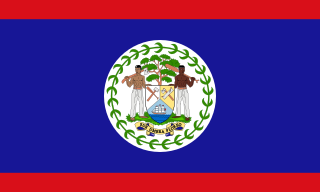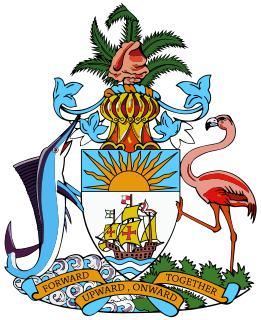
Belize is a Caribbean country located on the northeastern coast of Central America. Belize borders Mexico to the north, Caribbean Sea to the east and Guatemala to the south. It has an area of 22,970 square kilometres (8,867 sq mi) and a population of 419,199 (2020). Its mainland is about 290 km (180 mi) long and 110 km (68 mi) wide. It has the lowest population and population density in Central America. The country's population growth rate of 1.87% per year is the second highest in the region and one of the highest in the Western Hemisphere. Its capital is Belmopan, and its largest city is Belize City.

The Bahamas is a parliamentary constitutional monarchy headed by Queen Elizabeth II in her role as Queen of the Bahamas. The politics of the Bahamas takes place within a framework of parliamentary democracy, with a Prime Minister as the Head of Government. The Bahamas is an Independent Country and a member of the Commonwealth of Nations. As a former British colony, its political and legal traditions closely follow those of the United Kingdom. Queen Elizabeth II is the head of state, but executive power is exercised by the cabinet. Legislative power is vested in the two chambers of parliament. The Judiciary is independent of the executive and the legislature and jurisprudence is based on English common law. The multi-party system is dominated by the Progressive Liberal Party and the Free National Movement. The constitution protects freedom of speech, press, worship, movement, and association.

Politics of Belize takes place in a framework of a parliamentary representative democratic monarchy, whereby Queen Elizabeth II serves as head of state and the prime minister is the head of government, and of a multi-party system. Executive power is exercised by the government. Legislative power is vested in both the government and the Parliament of Belize.

Said Wilbert Musa is a Belizean lawyer and politician. He was the Prime Minister of Belize from 28 August 1998 to 8 February 2008.

Sir Colville Norbert Young is a Belizean politician who served as the 2nd Governor-General of Belize. He is also a patron of the Scout Association of Belize. He was appointed as the Governor-General in 1993, taking office on 17 November of that year, and was knighted in 1994.

The Progressive Liberal Party is a populist and social liberal party in the Bahamas. Philip Davies is the leader of the party.

The People's United Party (PUP) is one of two major political parties in Belize. It is currently the governing party of Belize after success in the 2020 Belizean general election, winning a majority of 26 seats out of 31 in the Belizean House of Representatives. It is a centre-left Christian democratic party. The party leader is Johnny Briceño, who currently serves as the Prime Minister of Belize.

The United Democratic Party (UDP) is one of the two major political parties in Belize. It is currently the main opposition party, having lost the 2020 Belizean general election, after previously holding the government across three prior terms. Founded as a centre-right conservative party, the UDP is led by the former minister of education Hon. Patrick Faber.

John Antonio "Johnny" Briceño is a Belizean politician who is the 5th and current Prime Minister of Belize since 12 November 2020, and the leader of the People's United Party (PUP) since 2016. He was Leader of the Opposition from 2008 to 2011 and from 2016 to 2020. From 1998 to 2007, he served as Deputy Prime Minister under Prime Minister Said Musa.

General elections were held in Belize on 27 August 1998. The result was a victory for the People's United Party, which won 26 of the 29 seats and Said Musa was elected as Prime Minister for the first time. Voter turnout was 90.1%, the highest since independence.

General elections were held in Belize on 7 February 2008. Beginning with this election, Belizeans elected 31 members to the House of Representatives of Belize instead of 29. In what was considered an upset, the opposition United Democratic Party (UDP) won the election with 25 out of 31 seats; the ruling People's United Party won six.

Lesbian, gay, bisexual, and transgender (LGBT) persons in Belize face legal challenges not experienced by non-LGBT citizens. Same-sex sexual activity was decriminalized in Belize in 2016, when the Supreme Court declared Belize's anti-sodomy law unconstitutional. Belize's constitution prohibits discrimination on the basis of sex, which Belizean courts have interpreted to include sexual orientation.
Edward Robert Broaster is a Belizean police officer and writer.

General elections were held in Belize on 4 November 2015 to elect members of the House of Representatives. On 28 September 2015 Prime Minister Dean Barrow announced that he had advised the Governor-General to dissolve the National Assembly and to fix Wednesday 4 November 2015 as the date for the next general elections.

General elections were held in Belize on 11 November 2020 to elect the 31 members of the House of Representatives. Nomination day was 21 October.

General elections were held in Barbados on 24 May 2018. The result was a landslide victory for the opposition Barbados Labour Party (BLP), which won all 30 seats in the House of Assembly, resulting in BLP leader Mia Mottley becoming the country's first female Prime Minister. The BLP's victory was the first time a party had won every seat in the House of Assembly. Previously, the most one-sided result for a Barbadian election had been in 1999, when the BLP won 24 of the 28 seats. The BLP's 73.5 percent vote share was also the highest on record.
A referendum on the territorial dispute with Guatemala was held in Belize on 8 May 2019. Voters were asked whether the territorial dispute with neighbouring Guatemala should be referred to the International Court of Justice.

General elections were held in Trinidad and Tobago on Monday, 10 August 2020, to elect 41 members to the 12th Trinidad and Tobago Republican Parliament. It was the 14th election since gaining independence from the United Kingdom in 1962 and the 22nd national election in Trinidad and Tobago ever. Tracy Davidson-Celestine, political leader of the Tobago Council of the People's National Movement (PNM) became the first woman to lead a Tobagonian political party with representation in the House of Representatives. Additionally, two of the three largest parties elected in 2015, the United National Congress (UNC) and the Congress of the People (COP), were led by women.

General elections were held in Saint Vincent and the Grenadines on 5 November 2020. Nomination day was 20 October 2020. The result was a victory for the Unity Labour Party, its fifth in a row; the party won nine of the fifteen seats, gaining one seat. These elections marked the first time since 1998 that the party which received the most votes did not win the most seats.

General elections were held in Saint Lucia on 26 July 2021, having been constitutionally required by 12 October 2021. Voters elected all 17 members of the House of Assembly. The result was a victory for the opposition Saint Lucia Labour Party, which won 13 of the 17 seats in the House, while the ruling United Workers Party lost nine of its eleven seats. It was the fourth consecutive election in which the incumbent government lost.


















